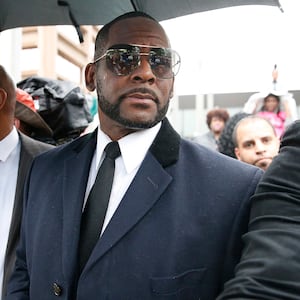For over a quarter of a century, R. Kelly allegedly used his position of power to lure young women and girls under the guise of jump-starting their musical careers.
To successfully cultivate an organized system of sexual abuse, prosecutors will argue during Kelly’s trial in Brooklyn federal court opening Wednesday, the disgraced R&B singer relied on those closest to him.
In particular: an inner circle of bodyguards, managers, personal assistants, and drivers.
“R. Kelly, together with employees and members of his entourage, engaged in a racketeering enterprise that preyed upon women and girls who attended his concerts so that the victims could be available to engage in illegal sexual activity with him at a moment’s notice,” former United States Attorney Richard Donoghue said after Kelly’s 2019 indictment.
The argument that Kelly was at the head of a criminal enterprise is fundamental to the prosecution’s federal racketeering case against Kelly, a statute commonly referred to by the acronym RICO—and often reserved for mafia bosses. It differs from the case laid out by federal prosecutors in Chicago, who accuse the singer of child pornography, sexual abuse of minors, and obstruction of justice. He is also facing state charges in Minnesota after allegedly soliciting a minor after meeting her at one of his concerts in 2001, along with state charges in Illinois.
He has pleaded not guilty to all charges against him.
Legal experts say that simply put, Brooklyn feds are trying to prove that Kelly was the godfather of an enterprise bankrolled by his music career and devoted to advancing his sexual deviancy.
“In organized crime families, there is a head figure that pulls the strings, which is consistent with what happened here in Kelly’s case,” Jeffrey Cramer, a New York former federal prosecutor, told The Daily Beast. “You could argue R. Kelly is leading the organization—and everyone else underneath him is a soldier.”
“There is no threat of shooting and murder, like in other mob-related cases. Here, these lower-level people helped facilitate their crimes to keep their jobs,” he added, noting that in this unique case, the legitimate part of the enterprise “also sold millions of records and made millions of dollars.”
Since Kelly’s arrest in 2019, authorities have come hard after those seemingly closest to the Grammy-winning singer and producer. Last August, three Kelly associates were charged for trying to “intimidate, threaten, or corruptly influence” Kelly accusers. In at least two cases, the offenses were said to take place after the singer was hit with federal charges in Brooklyn and Chicago. In other words, when it was clear Kelly was on the ropes.
Among the intimidation tactics: setting fire to a parked car outside one accuser’s house, discussing paying another half a million dollars for silence, threatening to reveal sexually explicit photos, and calling in a threat at a documentary screening, prosecutors said.
At the time of the trio’s arrests, the singer’s former attorney, Steve Greenberg, tweeted that his client “had nothing to do with any of these alleged acts.”
In a statement, a Kelly spokesperson told The Daily Beast this week, “At this point, the public has only heard one side of the story in this case and that is about to change in the coming weeks. We look forward to the truth and the facts coming to light as the defense will continue to vigorously defend Mr. Kelly. After all, the RICO ‘Enterprise’ is based on a series of independent relationships and events that the government is trying to patch together like different types of fabrics and trying to pass it off as silk.”
But at least two of the three who were arrested—Michael Williams, a relative of one of Kelly’s former publicists, and Richard Arline Jr., a self-proclaimed longtime friend of Kelly—have pleaded guilty. Both have yet to be sentenced, and prosecutors have declined to comment to The Daily Beast about how, if at all, they are involved in the current case against Kelly.
Donnell Russell, a “self-described manager, advisor, and friend of Kelly” who was arrested around the same time, was in the middle of plea negotiations on interstate stalking charges as of last November, prosecutors said during a status hearing.

Donnell Russell
Police HandoutProsecutors canvassed by The Daily Beast said someone like that could be awfully useful in going after an alleged kingpin. And while the charges against the three men are not cited in Kelly’s indictment—since some of the alleged acts had not yet occurred at the time of the singer’s arrest—experts said they do provide a rare look into the logistics of the alleged enterprise and the lengths those closest to the singer would go to protect him.
“In a RICO case, prosecutors need folks involved in the enterprise, involved in the intimidation or the bribery, to provide information about the mechanics on how everything went down,” former federal prosecutor Neama Rahman told The Daily Beast.
“And the feds are very good at flipping people, so [I] wouldn’t be surprised if there are cooperating witnesses we don’t know about,” he added.
While it is not publicly known if any of the three individuals who were arrested last August flipped on Kelly, Rahman noted, just the allegations against them could be helpful in the prosecution’s case.
As for Kelly, 54, he has pleaded not guilty to a nine-count federal indictment in New York, including racketeering based on sexual exploitation of children, kidnapping, forced labor, and Mann Act violations. That law refers to the transport of people across state lines for sex. The charges name at least six women and girls who were allegedly abused by Kelly.
At least three of Kelly’s accusers were expected to testify—though prosecutors have not laid out their full witness list.
“Anytime you have people on the inside, whether it’s a RICO case or a conspiracy case, it’s really important,” Cramer told The Daily Beast. “While you could have documents or other people testify, prosecutors need people who have been in the inner workings of the enterprise, [and] know what happened. It makes for an easier presentation for prosecutions. In my experience, usually, when you have multiple people on the inside all say fairly consistent testimony, it’s very powerful.”
In April, 39-year-old Williams admitted he set a rental SUV parked outside the home of one of Kelly’s accusers ablaze in June 2020, after she publicly alleged physical and mental abuse by Kelly during their relationship.
According to a criminal complaint, prosecutors said that one of the adults who heard the explosion ran outside the house and saw “an individual fleeing from the scene of the fire, whose arm appeared to be lit on fire.” Fire investigators also found an accelerant spread around most of the perimeter of the house.
“Williams also performed internet queries about the detonation properties of fertilizer and diesel fuel, witness intimidation and witness tampering, and countries that do not have extradition with the United States,” the complaint said. It went on to say that surveillance footage, toll records, photographs, and internet searches prove that Williams had driven from his Georgia home to the victim’s home in Florida.

Michael Williams
Police HandoutArline Jr., 31, pleaded guilty in February to trying to offer one of Kelly’s accusers—who said she slept with Kelly when she was 17—thousands of dollars in exchange for her silence.
“Me and another person offered Jane Doe money for her to not go forward with her complaint or testimony against Robert Kelly,” Arline Jr. admitted during his virtual plea hearing in Brooklyn federal court. “I knew what I did was wrong.”
According to a criminal complaint, Arline Jr. began his campaign to silence the “Jane Doe” after Kelly was hit with the racketeering and sex-trafficking charges in Brooklyn. In one May 26, 2020, text conversation, he texted the accuser that Kelly was trying to get a cousin, who prosecutors do not name, in contact with her because “he wants to pay you for silence.”
Under the direction of law enforcement, whom she immediately contacted after seeing a message from Arline Jr., Jane Doe questioned the man about “how much [Kelly] is trying to give me.” The question prompted him to set up a call to discuss “a proposal in which Jane Doe would receive $500,000 in exchange for not continuing to cooperate with the government against Kelly,” the complaint states.
It was not immediately clear if this Jane Doe was set to be a witness or factored directly into the criminal charges in the Brooklyn case.
In another recorded phone call with an unnamed witness, Arline Jr. allegedly said, “If I had a way to talk to Rob [Kelly], being next to him and telling him what’s going on, without nobody listening to, no feds, nobody, he gonna pay her... off to be quiet.’
He added, she “got too much. She got too much.”
But while Williams and Arline Jr. have admitted to crimes on behalf of the embattled music star, one of Kelly’s former managers who was charged alongside them was working on a deal behind closed doors, prosecutors said during his status hearing.
Brooklyn prosecutors say Russell, 45, harassed and intimidated another Kelly accuser and her mother after the pair filed a May 2018 civil lawsuit against the singer. According to a criminal complaint, Russell threatened to reveal sexually explicit photographs of the woman if she did not withdraw the lawsuit against Kelly. Russell also allegedly asked the woman to “cease her participation and association with the organizers” of a “negative campaign” against the singer.
In November 2018, Russell allegedly mailed a letter to the woman’s lawyer with attachments of cropped nude photographs. “The next two pictures have been cropped for the sake of not exposing her extremities to the world, yet!!!” the letter, which was purportedly written by Kelly, read, prosecutors said in a criminal complaint.
A month later, using an alias “Colon Dunn,” Russell allegedly sent a series of text messages to the woman and her mother with the same nude photographs—and a threat that they have “been warned.”
Manhattan prosecutors also accuse Russell of allegedly placing a threatening phone call to NeueHouse in New York City in an attempt to prevent the Dec. 4, 2018, screening of Surviving R. Kelly, a six-hour Lifetime docuseries about the slew of abuse allegations against the disgraced singer. In the call, which came after repeated efforts to stop the event, Russell allegedly said there was a “person in the theater with a gun prepared to shoot up the screening.”
The plea deals against Kelly’s cronies, along with previous accounts from former members of the “I Believe I Can Fly” singer’s inner circle in interviews and documentaries, suggested a once formidable entourage was showing signs of collapse.
In Surviving R. Kelly, his former tour manager, Demetrius Smith, said he had helped the singer obtain fake paperwork so he could marry 15-year-old singer Aaliyah in 1994. As part of the current case in Brooklyn, prosecutors allege Kelly bribed a state employee to create a fake ID for the teenage singer to falsely state that she was 18.
“I had papers forged for them. But Aaliyah was underage,” Smith, who later told several news outlets he had been subpoenaed to testify in Kelly’s criminal case, said in the documentary.
Gem Pratts, one of Kelly’s former bodyguards and a childhood friend, has also spoken out about his involvement in the alleged enterprise. In a 2019 interview with People magazine, Pratts admitted he saw “some strange propensities” when he worked as Kelly’s bodyguard for his first three tours in the 1990s.
“I would check [girls’] IDs. You had to be 18. I am the type to try to protect, and I feel bad that I maybe didn’t do enough. I look back now and just wish I had seen more and was able to do more. It kind of tugs at me,” he said.
Among the women who would ultimately come out against Kelly was Pratts’ sister, Andrea “Drea” Kelly, who was married to the singer until 2009 and eventually was interviewed in Surviving R. Kelly.
“I have situations where I would question her not being able to look certain people in the eye,” Pratts told People of his sister. “I knew he was controlling, but, at that point, hell, as long as you are not putting your hands on her, that’s just life.”
“He’s godly when it comes to getting in someone’s head. I almost want to say it’s like quasi-hypnotism,” the former bodyguard added.
Cramer, the former federal prosecutor, stressed to The Daily Beast that all these public allegations made against Kelly can—and should—be used by prosecutors to show the full breadth of influence his “criminal enterprise” had throughout the last three decades.
“It does not matter that these three were arrested after Kelly’s indictment, they can still be used as prosecution witnesses,” he said. “I would imagine a part of their plea deals is cooperation.”
“Usually, in a RICO case, you would get one or the other,” Cramer added, referring to prosecutors potentially calling on people they identify as victims, but also enablers, as witnesses. “[To] have both the emotional and the logical side—it’s a strong case.”







